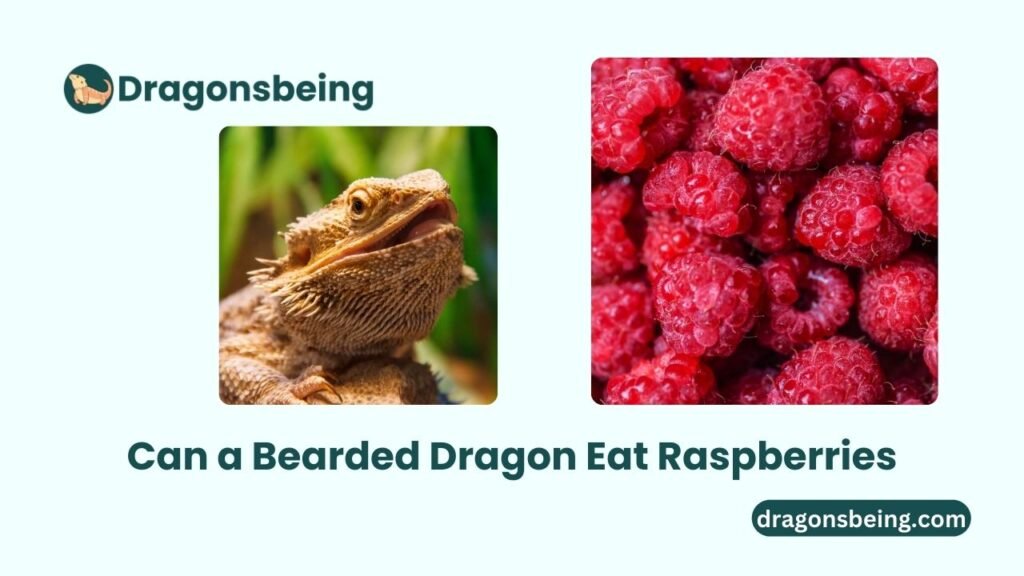Yes, bearded dragons can eat raspberries, but only in moderation. These fruits are high in sugar, so limit their intake.
Bearded dragons are popular pets known for their unique dietary needs. A balanced diet is crucial for their health and well-being. While they primarily consume insects and leafy greens, fruits like raspberries can be a tasty treat. Raspberries offer vitamins and antioxidants that may benefit your dragon.
However, these fruits contain significant sugar levels, which can lead to health issues if fed too often. Understanding the right balance in their diet ensures your bearded dragon remains healthy and happy. Always wash fruits thoroughly and remove any seeds before offering them to your pet.
Introduction To Bearded Dragon Diet
Bearded dragons are popular pets. Their diet is vital for their health. Understanding what they eat helps owners provide proper care. This section covers their natural eating habits and common foods in captivity.
Natural Habitat Eating Habits
In the wild, bearded dragons eat a variety of foods. Their diet mainly consists of:
- Insects
- Fruits
- Vegetables
Bearded dragons are omnivores. They enjoy a mix of protein and plant-based foods. Insects like crickets and mealworms are their favorites. Fruits like raspberries provide essential vitamins.
Common Captivity Diet Varieties
Pet owners can offer a balanced diet. Here are common foods for bearded dragons:
| Food Type | Examples | Benefits |
|---|---|---|
| Insects | Crickets, Mealworms, Dubia Roaches | High in protein |
| Vegetables | Collard Greens, Squash, Bell Peppers | Rich in fiber |
| Fruits | Raspberries, Strawberries, Blueberries | Source of vitamins |
Raspberries can be a tasty treat. They should be fed in moderation. Too many fruits can upset digestion.
Owners should wash fruits before feeding. This removes pesticides and chemicals. Always slice fruits into small pieces. This prevents choking hazards.
Nutritional Value Of Raspberries
Raspberries are delicious and nutritious fruits. They are low in calories and packed with vitamins. Understanding their nutritional value helps you decide if they are suitable for your bearded dragon.
Key Vitamins And Minerals
Raspberries contain several essential vitamins and minerals. Here’s a quick overview:
| Vitamin/Mineral | Benefits |
|---|---|
| Vitamin C | Boosts the immune system |
| Vitamin K | Supports bone health |
| Magnesium | Aids muscle function |
| Manganese | Helps in metabolism |
Sugar And Fiber Content
Raspberries have a moderate sugar level and high fiber. Here’s what to know:
- Sugar Content: About 4.4 grams per 100 grams.
- Fiber Content: Approximately 6.5 grams per 100 grams.
The fiber helps in digestion. Low sugar content makes raspberries a healthier option.
Feeding Raspberries To Bearded Dragons
Feeding your bearded dragon a variety of fruits adds excitement to their diet. Raspberries are colorful and tasty. They can be a delightful treat. Understanding how to serve them is essential for your pet’s health.
Appropriate Serving Sizes
Raspberries are rich in vitamins and antioxidants. However, serving sizes matter. Too many can lead to health issues.
Follow these guidelines for feeding raspberries:
- Small dragons (under 6 months): 1-2 raspberries per week.
- Medium dragons (6 months to 1 year): 3-5 raspberries per week.
- Adult dragons (over 1 year): 5-10 raspberries per week.
Always cut raspberries in half. This prevents choking hazards. Monitor your dragon for any digestive issues.
Frequency Of Feeding Raspberries
Raspberries should not be a daily food. They are high in sugar. Treat them as an occasional delight.
Follow this schedule for feeding raspberries:
| Age Group | Recommended Frequency |
|---|---|
| Under 6 months | Once a week |
| 6 months to 1 year | Twice a week |
| Over 1 year | 2-3 times a week |
Mix raspberries with other fruits and vegetables. This creates a balanced diet. Always wash raspberries thoroughly before serving.
Potential Health Benefits
Feeding your bearded dragon raspberries can offer some surprising health benefits. These small fruits are not just tasty; they can also enhance your pet’s well-being. Let’s dive into the specific benefits raspberries provide.
Antioxidants And Immune Support
Raspberries are rich in antioxidants. These compounds help fight free radicals in the body. A strong antioxidant intake boosts the immune system. A healthy immune system helps your bearded dragon fend off diseases.
- Vitamins: Raspberries contain vitamins A, C, and E.
- Anti-inflammatory properties: They reduce inflammation in the body.
- Cell protection: Antioxidants protect cells from damage.
Hydration And Digestive Health
Raspberries have high water content. This helps keep your bearded dragon hydrated. Hydration is vital for overall health and energy levels.
The fiber in raspberries aids digestion. Good digestion helps your pet absorb nutrients better. Here’s how raspberries contribute:
| Benefit | Description |
|---|---|
| Hydration | Raspberries are about 85% water. |
| Digestive Health | Fiber promotes healthy bowel movements. |
Include raspberries in moderation. Too much can upset their stomach. A few pieces once in a while are perfect!
Risks And Considerations
Feeding your bearded dragon raspberries can be tricky. Understanding the risks is essential. Two main concerns are sugar content and potential pesticides.
Sugar Content And Obesity
Raspberries contain high sugar levels. Bearded dragons can develop obesity from excess sugar. Obesity can lead to serious health issues.
- Weight gain
- Heart problems
- Joint issues
Limit raspberries to small amounts. Make sure to balance their diet. Offer a variety of vegetables and insects. This helps maintain a healthy weight.
Pesticides And Toxins
Raspberries may carry pesticides. These chemicals can harm your bearded dragon. Always wash fruits thoroughly before feeding.
Consider the following tips:
- Buy organic raspberries when possible.
- Inspect for any visible dirt or chemicals.
- Use a vegetable wash for extra safety.
Monitor your bearded dragon after feeding raspberries. Look for any signs of distress. Quick action can prevent serious issues.
Preparing Raspberries For Your Pet
Feeding your bearded dragon raspberries can be a treat. Proper preparation is essential. Clean and cut the fruit correctly. Choose the right type of raspberries. Let’s explore how to do this.
Washing And Cutting Techniques
Start with washing the raspberries. This removes dirt and pesticides. Follow these steps:
- Rinse the raspberries under cool running water.
- Gently rub each raspberry to remove residue.
- Pat them dry with a clean towel.
Next, cut the raspberries. This makes them easier to eat:
- Slice them in half for small dragons.
- For larger dragons, cut into smaller pieces.
Always remove any moldy or damaged raspberries. Fresh fruit is best for your pet.
Organic Vs. Non-organic Choices
Choosing between organic and non-organic raspberries matters. Organic raspberries have fewer chemicals. They are safer for your bearded dragon.
Consider these points:
| Type | Benefits | Drawbacks |
|---|---|---|
| Organic | Fewer pesticides | Usually more expensive |
| Non-Organic | More affordable | Higher pesticide levels |
Always wash non-organic raspberries thoroughly. This helps reduce pesticide exposure. Choose organic whenever possible for your pet’s health.
Incorporating Raspberries Into A Balanced Diet
Raspberries can be a tasty treat for your bearded dragon. They add color and flavor to their meals. But, they should not be the main food. Raspberries must be part of a balanced diet.
Combining With Other Foods
Mixing raspberries with other foods is essential. Here are some great combinations:
- Leafy Greens: Combine raspberries with kale or collard greens.
- Vegetables: Pair with bell peppers or zucchini.
- Protein: Serve alongside insects like crickets or mealworms.
This variety ensures your dragon gets a range of nutrients.
Avoiding Nutritional Imbalances
Feeding only raspberries can cause problems. Raspberries are high in sugar. Too much sugar can lead to obesity. Here are tips to avoid imbalances:
- Limit raspberries to once a week.
- Mix with low-sugar fruits like cucumbers.
- Ensure a good balance of insects and greens.
Always remember, a balanced diet keeps your bearded dragon healthy and happy.
Alternatives To Raspberries
Bearded dragons enjoy a variety of fruits. While raspberries are tasty, many other fruits are safe. Exploring these alternatives can provide a balanced diet for your pet.
Other Safe Fruits For Bearded Dragons
Many fruits are safe for bearded dragons. Here are some popular options:
- Blueberries: Small and packed with antioxidants.
- Strawberries: Sweet and can boost hydration.
- Mango: Rich in vitamins A and C.
- Peaches: Soft and easy to digest.
- Bananas: High in potassium but should be given sparingly.
| Fruit | Benefits | Serving Size |
|---|---|---|
| Blueberries | High in antioxidants | 2-3 berries |
| Strawberries | Hydration boost | 1-2 berries |
| Mango | Vitamins A and C | 1-2 slices |
| Peaches | Easy digestion | 1 slice |
| Bananas | High in potassium | 1 small piece |
When To Opt For Different Treats
Choose fruits based on your bearded dragon’s age. Young dragons need more protein. Adults can enjoy more fruits.
Use fruits as occasional treats. Limit sugary fruits like bananas. Always wash fruits thoroughly before feeding.
Observe your dragon’s reaction. If they show signs of upset stomach, change the fruit.
Monitoring Your Bearded Dragon’s Health
Monitoring your bearded dragon’s health is crucial for their well-being. A balanced diet helps maintain their health. Knowing what to watch for can help you spot problems early.
Signs Of A Good Diet
A healthy diet is essential for your bearded dragon. Here are some signs that indicate a proper diet:
- Bright eyes: Clear and alert eyes mean good health.
- Active behavior: Regular activity shows they are feeling well.
- Healthy weight: Maintain a proper weight for their age.
- Proper shedding: Smooth and regular shedding indicates good nutrition.
- Normal droppings: Solid and well-formed droppings are a good sign.
When To Consult A Veterinarian
Sometimes, you may need to see a vet. Watch for these signs:
- Loss of appetite: If your dragon refuses to eat for more than a day.
- Weight loss: Noticeable decrease in weight is concerning.
- Changes in behavior: Lethargy or hiding more than usual.
- Abnormal droppings: Diarrhea or very loose stools are red flags.
- Skin issues: Signs of irritation or abnormal shedding.
Regular check-ups are vital. They help catch issues early. A vet can provide advice on diet and care.
Frequently Asked Questions
Can Bearded Dragons Eat Fruits Like Raspberries?
Yes, bearded dragons can eat raspberries in moderation. They provide vitamins but should not be a staple food.
How Many Raspberries Can A Bearded Dragon Eat?
Limit raspberries to a few small pieces once a week to avoid digestive issues.
Are Raspberries Safe For Bearded Dragons?
Raspberries are safe but should be offered occasionally due to their sugar content.
What Nutrients Do Raspberries Provide For Bearded Dragons?
Raspberries contain antioxidants, fiber, and vitamins, benefiting a bearded dragon’s overall health.
Can Baby Bearded Dragons Eat Raspberries?
Baby bearded dragons should avoid raspberries due to their high sugar content. Stick to safer options.
What Other Fruits Can Bearded Dragons Eat?
Bearded dragons can enjoy strawberries, blueberries, and melons, but offer these fruits sparingly.
Conclusion
Bearded dragons can enjoy raspberries in moderation. These fruits offer vitamins and antioxidants beneficial for their health. Always wash and cut them into small pieces. Monitor your pet for any adverse reactions. Providing a varied diet will help keep your bearded dragon happy and healthy.
Enjoy feeding your scaly friend!

Hi, I’m Dr. Michelle Mayers, a veterinary professional with a deep passion for animal health and well-being. Over the years, I’ve dedicated my life to caring for animals and helping pet owners better understand their furry, feathered, or scaly companions. On my blog, Dragonsbeing, I share insights, tips, and stories that aim to educate, inspire, and connect with fellow animal lovers. Join me at Dragonsbeing as we explore the fascinating world of veterinary care and celebrate the special bond between humans and animals!


